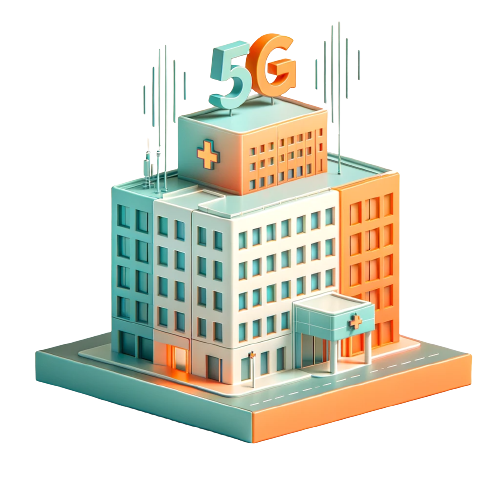
Powering Offshore Wind with Private 5G: Smarter, Safer, and More Resilient Operations
Offshore wind needs smarter operations. Explore how Private 5G enables real-time monitoring, predictive maintenance, and safer crews
The Accelleran Academy is your go-to source for the latest updates on 5G use cases, RAN Intelligence, and more.
Stay informed and ahead of the curve by following us on social media for our newest content.

Many people would not consider healthcare to be a primary focus for digital transformation. However, change is happening, and the use cases are going to change the way we think about healthcare. Private 5G networks are bringing the high speeds and low latencies required to bring about the next evolution in healthcare, analogous to Industry 4.0 in manufacturing.
Private 5G networks are creating a robust connectivity framework essential for modern medical practices, encompassing telemedicine, remote monitoring, and the seamless handling of massive health data sets.
Healthcare environments are complex, requiring unwavering accuracy, swift response times, and adaptability. These Private 5G networks bring the bandwidth and dependable connectivity that enables healthcare providers to elevate the delivery standards of their service.
Medical professionals can now leverage the full potential of cutting-edge technologies such as the Internet of Medical Things (IoMT), advanced diagnostic tools, and AI-driven analytics, ensuring that patient care is precise and personalised.
High-Speed Data Transmission: Private 5G networks offer the bandwidth and speed essential for handling the huge volumes of data generated in healthcare settings. This data includes foe example the swift transfer of complex medical images and patient records. The speeds 5G provides can facilitate quicker and more effective diagnoses and treatments.
Enhanced Security and Privacy: Private 5G networks offer superior security measures. Hospital data breaches are now becoming a regular news story. Private 5G networks provide an extra layer of security to safeguard sensitive patient data against unauthorised access and cyber threats. This also ensures compliance with stringent healthcare regulations.
Seamless Connectivity Across Facilities: Healthcare institutions require a consistent and reliable connectivity to ensure the smooth delivery of medical services. Poor connectivity should never be an excuse when it comes to people’s health. Private 5G networks can provide a tailored solution that keep patients and doctors connected, regardless of their location within a medical facility, enhancing collaboration and patient care.
Mobility and Flexibility with IoT Integration:
The Private 5G is flexible. It allows for the integration of vast numbers of IoT devices, including wearable health monitors and sensors. You’ll see many use cases related to real-time health monitoring – allowing healthcare professionals to efficiently manage the patients who need them most.
Remote Patient Care:
Private 5G networks enable continuous monitoring of patients’ vital signs and health status remotely. This is particularly beneficial for chronic disease management and post-operative care, allowing healthcare providers to promptly respond to any changes in a patient’s condition.
Telemedicine and Virtual Consultations:
With high-speed and reliable connectivity, telemedicine becomes more efficient and accessible. Patients can consult with their doctors via video calls, reducing the need for physical visits and enabling timely medical advice.
Augmented and Virtual Reality in Surgical Training:
Surgeons and medical students can leverage AR and VR tools for immersive training experiences. These technologies, supported by Private 5G networks, provide realistic simulations, enhancing skill development and surgical precision.
Private 5G is revolutionizing healthcare by providing high-speed, low-latency connectivity essential for advanced medical applications. This includes telemedicine, remote patient monitoring, and the integration of the Internet of Medical Things (IoMT), all of which enhance the precision, efficiency, and personalization of patient care.
Private 5G networks offer the bandwidth and speed necessary for handling large volumes of medical data, such as complex medical images and patient records. This rapid data transmission facilitates quicker diagnoses, more effective treatments, and overall improved patient outcomes.
Private 5G networks provide superior security measures, including advanced encryption and secure data handling, which are critical in protecting sensitive patient information from unauthorized access and cyber threats. This ensures compliance with stringent healthcare regulations and reduces the risk of data breaches.
Private 5G enables efficient and reliable telemedicine services, allowing patients to consult with doctors via video calls, reducing the need for physical visits. It also supports continuous remote monitoring of patients’ vital signs, particularly beneficial for managing chronic conditions and post-operative care.
Private 5G networks provide the high-speed, low-latency connectivity required to support augmented reality (AR) and virtual reality (VR) applications in healthcare. These technologies can be used for immersive surgical training, enhancing the skills of medical professionals and improving surgical precision.

Offshore wind needs smarter operations. Explore how Private 5G enables real-time monitoring, predictive maintenance, and safer crews

The event brought together leading voices from across the global telecoms ecosystem to explore the state of the Open RAN market and showcase ongoing innovations

MWC Barcelona 2025 was a successful event for Accelleran, with more of our colleagues attending than ever before. Over the course of the week, we